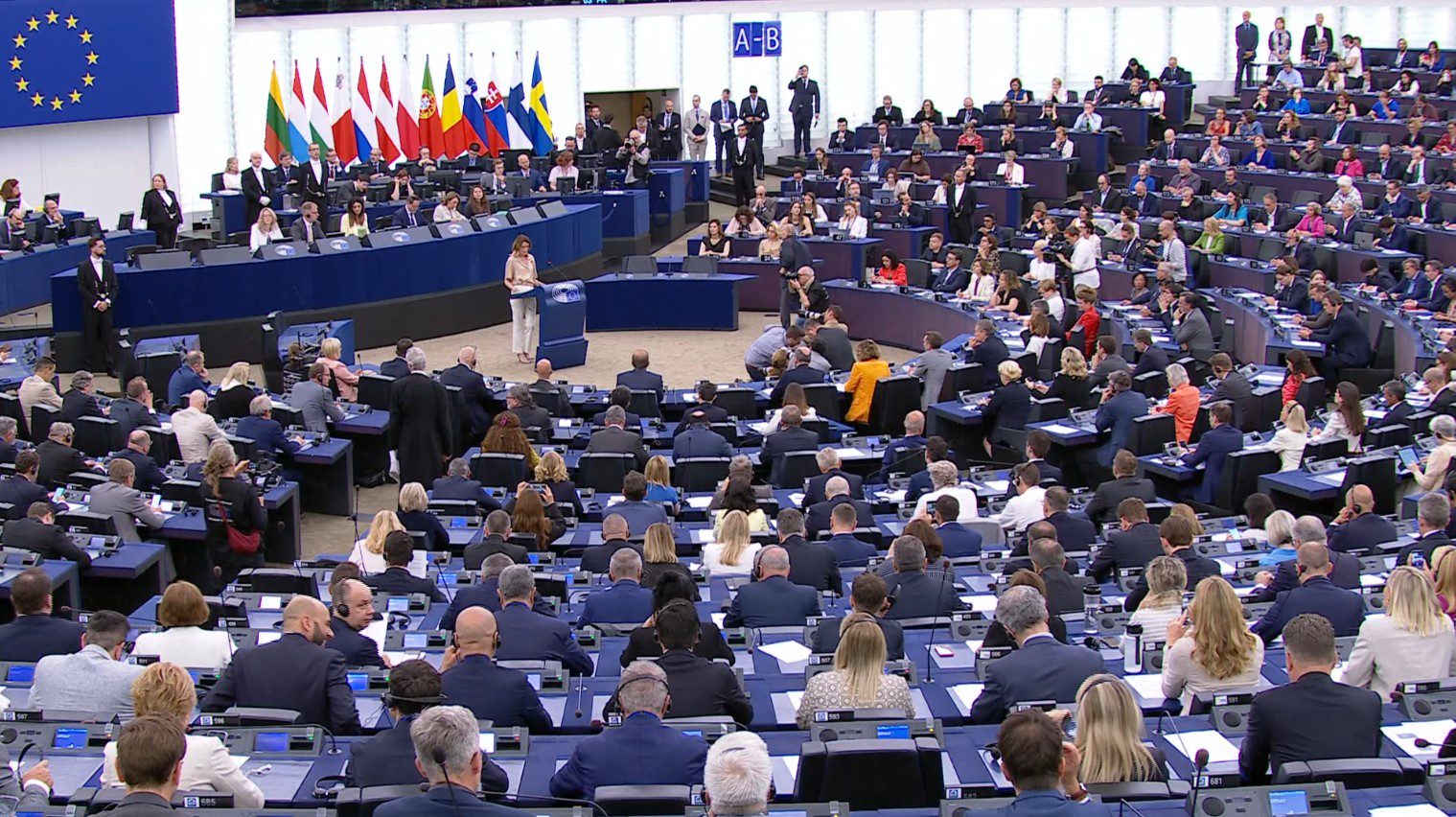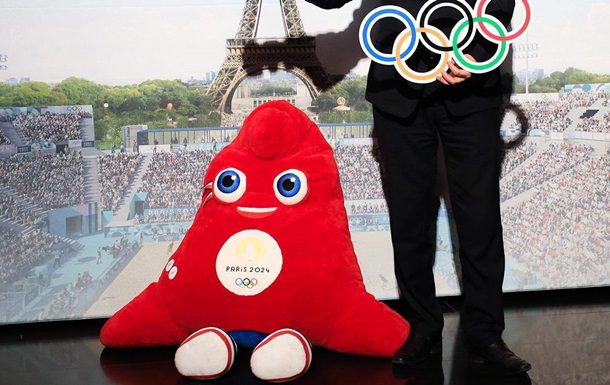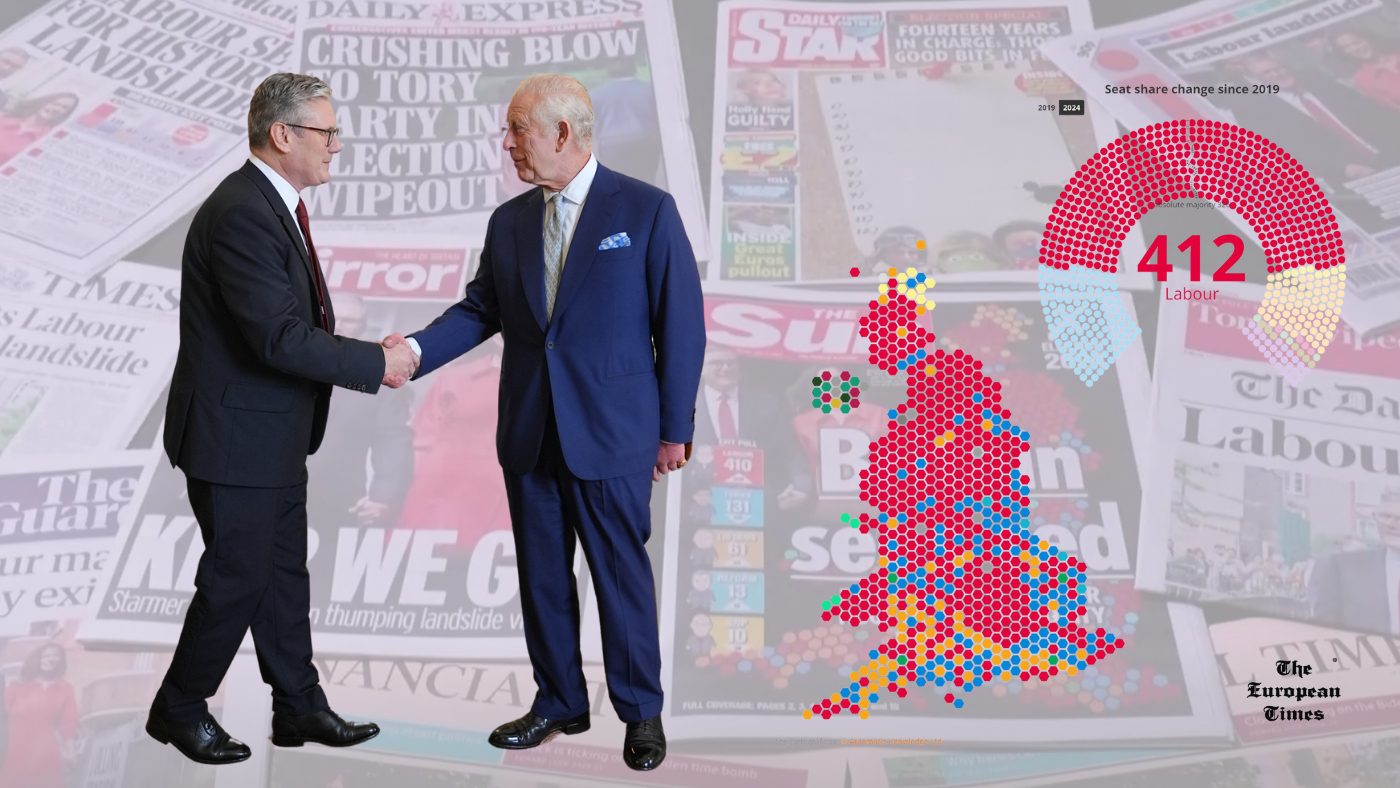Politics
European Parliament Press Kit for the European Council of 21 and 22 March 2024 | News
European Parliament President Roberta Metsola will represent the European Parliament at the summit, address the heads of state or government at 15.00, and hold a press conference after her speech.
When: Press conference at around 16.00 on 21 March
Where: European Council press room and via Parliament’s webstreaming or EbS.
At their meeting in Brussels, heads of state or government will focus on Russia’s war against Ukraine and the EU’s continued support for the country, the war in the Gaza Strip, European security and defence, enlargement, the EU’s response to the current concerns in the agricultural sector and on economic coordination.
Russia’s war against Ukraine
In a joint statement issued on 23 February, the Presidents of the EU institutions stressed that “the European Union will always support Ukraine’s independence, sovereignty and territorial integrity within its internationally recognised borders.
Russia and its leadership bear sole responsibility for this war and its global consequences, as well as for the serious crimes committed. We remain determined to hold them to account, including for the crime of aggression. (…)
The European Union will continue its strong and unwavering political, military, financial, economic, diplomatic and humanitarian support to help Ukraine defend itself, protect its people, its cities and its critical infrastructure, restore its territorial integrity, bring back the thousands of deported children, and bring the war to an end.
We will continue to address Ukraine’s pressing military and defence needs, including deliveries of urgently needed ammunition and missiles. (…) We are also working on future security commitments which will help Ukraine defend itself, resist destabilisation efforts and deter acts of aggression in the future.”
In a resolution adopted on 29 February, MEPs took stock of the two years since Russia’s full-scale invasion of Ukraine on 24 February 2022. Highlighting how the war has fundamentally changed the geopolitical situation in Europe and beyond, they say the main objective is for Ukraine to win the war, warning of serious consequences if that does not happen. MEPs say that other authoritarian regimes are watching how the conflict develops to assess their own leeway for enacting aggressive foreign policies.
For Kyiv to win the war, there should be “no self-imposed restriction on military assistance to Ukraine”, with Parliament reaffirming the need to provide the country with whatever is needed to regain full control over its internationally recognised territory.
All EU and NATO allies should support Ukraine militarily with no less than 0.25% of their GDP annually, MEPs argue, while urging EU countries to immediately enter into dialogue with defence companies to ensure increased production and deliveries of ammunition, shells and missiles to Ukraine, which should be prioritised over orders from other third countries
The resolution underlines the urgent need for a solid legal regime to allow Russian state-owned assets frozen by the EU to be confiscated and used for reconstruction in Ukraine and the compensation of victims of the war. Russia must be obliged to pay reparations imposed on it to ensure that it contributes substantially to rebuilding Ukraine.
On 12 March, Parliament adopted a directive, agreed with member states, on criminalising the violation and circumvention of EU sanctions. It will introduce a common definition of, and minimum penalties for, violations.
EU sanctions can consist of freezing funds and assets (including crypto-assets), travel bans, arms embargoes, and restrictions on business sectors. While sanctions are adopted at the EU level, enforcement relies on member states, amongst which the definitions of sanction violations and associated penalties vary. The new law sets consistent definitions for violations, which would include acts such as not freezing funds, not respecting travel bans or arms embargoes, transferring funds to persons subject to sanctions, or doing business with state-owned entities of countries under sanction. Providing financial services or legal advisory services in violation of sanctions will also become a punishable offence.
The directive ensures the punishment for violating and circumventing sanctions is dissuasive by making them criminal offences carrying prison sentences of a maximum of five years in all member states.
In a resolution adopted on 29 February, the European Parliament strongly condemns the murder of Alexei Navalny and gives its full support to Yulia Navalnaya in her determination to continue his work. MEPs stress that the full criminal and political responsibility for his death lies with the Russian state, and its president Vladimir Putin in particular, who should be held accountable.
Stressing that the people of Russia cannot be confused with the “warmongering, autocratic and kleptocratic regime of the Kremlin”, MEPs call on the EU and its member states to continue to show unfailing solidarity and actively support independent Russian civil society and the democratic opposition.
Parliament demands that the EU, its member states and likeminded partners around the world continue their political, economic, financial, and military support for Ukraine as the best answer to the current oppressive and aggressive practices by the Kremlin regime. Ukraine’s decisive victory may lead to genuine changes in the Russian Federation, in particular deimperialisation, decolonialisation and refederalisation, all of which are necessary conditions for establishing democracy in Russia.
Yulia Navalnaya, the widow of murdered Russian anti-corruption activist Alexei Navalny, addressed the European Parliament on 28 February.
In her speech, Ms Navalnaya accused Russian authorities, led by President Vladimir Putin, of having orchestrated Mr Navalny’s killing. She said that his public murder had once again shown everyone that “Putin is capable of anything and that you cannot negotiate with him”. She also expressed concern that none of the EU’s current restrictive measures have stopped Russia’s aggression in Ukraine.
To this end, Ms Navalnaya called for more innovative ideas to defeat Putin’s regime, both domestically and its actions towards its neighbours. “If you really want to defeat Putin, you have to become an innovator (…). You cannot hurt Putin with another resolution or another set of sanctions that is no different from the previous ones (…). You are not dealing with a politician but with a bloody mobster (…). The most important thing is the people close to Putin, his friends, associates, and keepers of the mafia’s money (…). You, and all of us, must fight this criminal gang.”
Further reading
Joint Statement by the Presidents of the European Union Institutions on the occasion of the 2 year anniversary of the Russian invasion of Ukraine
Parliament calls on the EU to give Ukraine whatever it needs to defeat Russia
EU sanctions: new rules to crack down on violations
MEPs: EU must actively support Russia’s democratic opposition
Yulia Navalnaya: “If you want to defeat Putin, fight his criminal gang”
Debate 12 March 2024: Preparation of the European Council meeting of 21 and 22 March 2024
Debate 13 March 2024: Need to address the urgent concerns surrounding Ukrainian children forcibly deported to Russia
Parliament wants tougher enforcement of EU sanctions against Russia
A long-term solution for Ukraine’s funding needs
How the EU is supporting Ukraine
EU stands with Ukraine
MEPs to contact
David McALLISTER, (EPP, DE), Chair of the Committee on Foreign Affairs
Nathalie LOISEAU (Renew, FR), Chair of the Subcommittee on Security and Defence
Michael GAHLER (EPP, DE), standing rapporteur on Ukraine
Andrius KUBILIUS (EPP, LT), standing rapporteur on Russia
Sophie in ’t Veld (Renew, the Netherlands), rapporteur on the violation of Union restrictive measures
War in the Gaza Strip
In a resolution adopted on 14 March, MEPs call on Israel to immediately allow and facilitate full aid delivery into and throughout Gaza via all existing crossings, underlining the urgent need for rapid, safe and unhindered humanitarian access.
They reiterate their call for an immediate and permanent ceasefire to address the looming risk of mass starvation in Gaza and the immediate and unconditional release of all hostages. The International Committee of the Red Cross must be given immediate access to all Israeli hostages being held in Gaza to provide them with medical care.
There can be no prospect of peace, security, stability and prosperity for Gaza or for Palestinian-Israeli reconciliation, MEPs warn, as long as Hamas and other terrorist groups play any role in Gaza.
Parliament also strongly condemns the rise in extremist settler violence and attacks by the Israeli armed forces against Palestinians in the West Bank, attacks that have already killed hundreds and injured thousands of Palestinian civilians. MEPs strongly condemn the acceleration of the illegal settlement of Palestinian land, which constitutes a violation of international law. They are deeply concerned about the risk of escalation in the conflict, in particular in Lebanon.
In a resolution adopted on 18 January, Parliament condemned in the strongest possible terms the despicable terrorist attacks committed by Hamas against Israel. MEPs also denounced the disproportionate Israeli military response, which has caused a civilian death toll on an unprecedented scale.
Israel has the right to defend itself within the limits of international law, they stress, which implies that all parties in a conflict must distinguish, at all times, between combatants and civilians, that attacks must only be directed at military objectives, and that civilians and civilian objects must not be targeted in the attacks.
The resolution also calls for a European initiative to put the two-state solution back on track and emphasises the absolute necessity of immediately relaunching the peace process. It welcomes the European Union and the Arab League’s Peace Day Effort for Middle East Peace, which was launched just before the attacks took place on 7 October.
Further reading
Parliament calls on Israel to open all crossings to Gaza for humanitarian aid
Israel-Hamas war: MEPs call for a permanent ceasefire under two conditions
MEPs condemn Hamas attack on Israel and call for a humanitarian pause
Resolution: The despicable terrorist attacks by Hamas against Israel, Israel’s right to defend itself in line with humanitarian and international law and the humanitarian situation in Gaza
President Metsola at the European Council: EU must remain coherent and united
Leading MEPs condemn attack by Hamas terrorists against Israel
MEPs to contact
David McALLISTER, (EPP, DE), Chair of the Committee on Foreign Affairs
European security and defence
In two reports on the EU’s foreign, security and defence policy, adopted on 28 February, MEPs warn that the Russian war of aggression against Ukraine has sparked a series of global economic shocks and added significant destabilising pressure on countries in the Western Balkans and the Eastern Partnership.
They want the EU to reform its neighbourhood policy and accelerate the enlargement process, while advancing institutional and decision-making reforms, including the publication of a roadmap for future work by the summer of 2024. MEPs urge the EU to improve its capacity to act in response to, as well as to pre-empt, global crises.
With US-China competition as a backdrop, Parliament is concerned about the increasing relevance of more exclusive formats of cooperation and emphasises that traditional multilateral forums – in particular the UN and its agencies –should be the EU’s preferred forums for cooperation.
With the focus on Russia’s illegal, unprovoked and unjustified war of aggression against Ukraine, Parliament highlights the role played by Iran, Belarus, North Korea and China in supporting the Kremlin’s war machine. MEPs say Russia’s war is part of a wider strategy to undermine the rules-based international order and underline that the EU will continue to support Kyiv with the necessary military means to end the conflict.
MEPs also demand an increase to and acceleration of the EU’s financial and military assistance, stressing that Ukraine’s military victory and the country’s future integration in the EU and NATO are necessary to guarantee Europe’s security, stability and sustainable peace.
Further reading
Foreign policy, security and defence: the EU should focus on strategic alliances
MEPs to contact
Nathalie LOISEAU (Renew, FR), Chair of the Subcommittee on Security and Defence
David McAllister (EPP, Germany), Chair of the Foreign Affairs Committee and rapporteur on the Common Foreign and Security Policy
Sven Mikser (S&D, Estonia), rapporteur on the common security and defence policy
Enlargement
On 19 March, MEPs on the Committee on Foreign Affairs discussed the future of EU enlargement with the foreign ministers of Austria, Denmark, Estonia, Finland, Latvia, Lithuania, Slovenia and the deputy ministers or secretaries of state of Bulgaria, Croatia, Cyprus, Greece and Hungary.
In the 2023 annual report on Common Foreign and Security Policy, MEPs warn that the Russian war of aggression against Ukraine has significantly destabilised countries in the Western Balkans and the Eastern Partnership. According to the report, this jeopardises EU security. To address this, MEPs recommend that the EU reforms its neighbourhood policy and accelerates the enlargement process.
In February, Parliament adopted a report calling for institutional and financial reforms to ensure the EU’s capacity to absorb new members. With the Ukraine Facility, it approved long-term funding for Ukraine to aid its recovery and modernisation efforts and to help it on its way to EU membership. MEPs also supported the Reform and Growth Facility for the Western Balkans to bolster the EU’s partners in the region by facilitating extensive socio-economic reforms, enhancing rule of law fundamental rights, and accelerating the economic alignment of these partners with the EU standards.
In a resolution adopted on 13 December, Parliament called the EU’s enlargement policy one of the strongest geopolitical tools at its disposal and a strategic investment in peace and security. MEPs are urging the European Council to open accession negotiations with Ukraine and the Republic of Moldova. Provided that certain steps are taken, MEPs say that accession talks should also be opened with Bosnia and Herzegovina, and Georgia should be granted candidate status.
MEPs also stress that the EU should establish a clear enlargement timetable for candidate countries to conclude accession negotiations by 2030. There should, however, be no fast-track route to membership. MEPs insist that the so-called Copenhagen criteria must be fulfilled to ensure that candidate and potential candidate countries demonstrate a consistent and enduring commitment to democracy, the rule of law, human rights and respect for the protection of minorities, and economic reforms.
Further reading
Serbia and Kosovo must work to de-escalate the situation in northern Kosovo
Montenegro’s EU accession progress is losing momentum
Parliament pushes for start of EU accession talks with Moldova
MEPs call on EU and Türkiye to look for alternative ways to cooperate
MEPs assess the situation in Albania and Bosnia and Herzegovina
MEPs to contact
David McAllister (EPP, Germany), Chair of the Foreign Affairs Committee
Tonino Picula (S&D, HR), rapporteur on Montenegro
Nacho Sánchez Amor (S&D, ES), rapporteur on Türkiye
Isabel Santos (S&D, PT), rapporteur on Albania
Paulo Rangel (EPP, PT), rapporteur on Bosnia and Herzegovina
Agriculture
The Commission’s simplification package for farmers and the contribution of the agricultural sector to the EU’s climate objectives were discussed in two debates with commissioners in the Agriculture Committee on 19 March. MEPs debated with the Commissioner for Agriculture, Janusz Wojciechowski, actions that the Commission is proposing to reduce the administrative burden on farmers. MEPs discussed the agricultural sector’s contribution to the EU’s climate objectives with the Commissioner for Climate Action, Wopke Hoekstra.
The debate with Commissioner Wojciechowski follows an exchange of views on the same topic MEPs had with Commission representatives during a committee meeting on 26 February. Link to re-watch the exchange.
In a letter sent on 20 February to Commissioner Wojciechowski, the Chair of the Agriculture Committee, Norbert Lins (EPP, DE), supported by the majority of political groups, put forward proposals to tackle current difficulties encountered by European farmers.
A plenary debate about sustainable and fairly-rewarded EU agriculture took place on 7 February. Link to re-watch the debate.
On 12 March, MEPs debated the need to impose sanctions on the import of Russian and Belarusian food and agricultural products to the EU and to ensure stability of EU agricultural production. You can watch the debate here.
MEPs to contact
Norbert Lins (EPP, DE), Chair of the Agriculture Committee
European economic coordination
On 13 March, MEPs adopted a resolution outlining their concerns and priorities for the next cycle of economic coordination between member states. They expressed their concerns about the economic situation, persistent economic uncertainty, and weak growth, competitiveness and productivity in the EU.
MEPs add that many member states are suffering from structural challenges that hinder their growth potential and that a lack of public and private investment in certain member states is blocking the potential for socially balanced and sustainable growth. They also stress that sufficient public investment is crucial to achieve the main objectives of the reform of the EU’s economic governance framework and to address the current and future priorities of the Union, such as financing the green and digital transitions.
Further reading
European economic coordination: Prioritise prudent investment and reform EU economies, MEPs say
MEPs to contact
René Repasi (S&D, DE), rapporteur
Politics
European Parliament begins its 10th term

European Parliament Convenes in Strasbourg: New President to be Elected amid Growing Diversity
On a momentous Tuesday in Strasbourg, the European Parliament, following the recent European elections held on 6-9 June, officially commenced its proceedings. The session, presided over by the outgoing EP President, Roberta Metsola of the EPP from Malta, commenced with a musical interlude before Pina Picierno, the second Vice-President in the outgoing Parliament from Italy’s S&D, announced the contenders for the coveted Presidency of the Parliament.
The highly anticipated vote, conducted through a secret paper ballot, is set to occur immediately after the inaugural session. To ensure a fair process, eight MEPs, selected by lot, will oversee the election proceedings.
The distinguished candidates vying for the Presidency are Roberta Metsola representing EPP from Malta and Irene Montero from The Left in Spain. Ahead of the crucial vote, both candidates delivered succinct statements to the plenary, outlining their visions for the future of the European Parliament.
To attain victory, a candidate must secure an absolute majority of valid votes cast, which equates to 50% plus one. In the event of no clear winner in the initial round of voting, subsequent rounds may follow with the possibility of new or existing candidates being nominated under the same stipulations. If needed, a third round could ensue with the same regulations. Should no candidate emerge victorious after the third round, the two candidates with the highest votes in this round will advance to a decisive fourth and final round, with the majority winner emerging triumphant.
Upon the election of the new President, the distinguished individual will assume the leadership position and deliver a notable opening address, setting the tone for the parliamentary term ahead.
In this landmark tenth term, the European Parliament boasts 720 seats, an increase of 15 from the previous legislature. Notably, 54% of MEPs are fresh faces, marking a slight decrease from the 2019 intake of 61%, with the representation of women comprising 39%, down marginally from the 40% mark in 2019.
Among the diverse MEP cohort, Lena Schilling, a 23-year-old from Austria representing Greens/EFA, stands as the youngest member, while the seasoned Leoluca Orlando from Italy, a Green/EFA representative aged 77, holds the distinction of the oldest MEP. The average age of MEPs stands at 50, reflecting a diverse range of experiences and perspectives within the parliamentary body.
As the tenth term commences, the European Parliament encompasses eight political groups, an increase from the previous session. Additionally, 32 MEPs remain non-attached, underscoring the dynamic landscape of political affiliations within the Parliament and highlighting the vibrant tapestry of representation in the European legislative body.
Politics
For the first time in 40 years, the Olympics will not be broadcast in Russia

Not a single TV channel, streaming platform or cinema in Russia will show the competitions from the Summer Olympics in Paris, which begin on July 26, sports.ru writes. This happened for the first time in 40 years, when in 1984 the USSR boycotted the Olympics in Los Angeles.
The official explanation is that this time only 16 athletes will participate under a neutral flag, without an anthem and in “unpopular sports”. The unofficial thing is that this is a purely political decision of the Kremlin, and heads of federations call those who agreed to participate traitors, homeless people and foreign agents.
Paris Mayor on Russians at the 2024 Olympics: It would be better if they didn’t come
Anne Hidalgo condemned the International Olympic Committee’s decision regarding representatives of the aggressor country, she said already in March.
According to the official, it would be good if athletes from the terrorist country did not participate in international competitions.
“I prefer that they not come. We cannot act as if the invasion does not exist. We cannot act as if Putin is not a dictator who is threatening all of Europe today.”
At the same time, she added that such sanctions cannot be imposed against Israeli athletes, since Israel’s actions are different from Russia’s aggression.
“There can be no talk of imposing sanctions against Israel in connection with the Olympic and Paralympic Games. Because Israel is a democratic country,” the mayor told Reuters.
Photo: Social Network / korrespondent.net.
Politics
Keir Starmer Secures Historic Labour Victory, Ending 14 Years of Conservative Rule in UK

London – In a seismic shift in British politics, the Labour Party, led by Keir Starmer, has achieved a resounding victory in the UK general election, bringing an end to 14 years of Conservative governance. The results, which had been foreshadowed by months of polling, have given Labour its strongest parliamentary majority since 2001.
Labour secured an impressive 412 seats, far surpassing the 326 required for an absolute majority and more than doubling their 2019 performance. This landslide victory marks a dramatic turnaround for the party and signals a clear desire for change among the British electorate.
Upon learning of his victory in his central London constituency, Starmer declared, “The people have spoken, and they are ready for change.” This statement encapsulates the mood of a nation seemingly eager to embark on a new political chapter.

The Conservative Party, in stark contrast, suffered its worst defeat since its founding in 1834. The Tories lost at least 250 seats compared to their 2019 performance under Boris Johnson, ending up with a mere 121 seats. This historic collapse prompted the outgoing Prime Minister, Rishi Sunak, to apologize to “those Conservatives who have lost despite their dedication” while congratulating Starmer on his victory.
The election also saw significant shifts for other parties. The Liberal Democrats, led by Ed Davey, emerged as the third-largest party with 71 seats, a gain of 63 from the previous election. The Scottish National Party (SNP) experienced a dramatic decline, securing only nine seats, a loss of 38 compared to 2019. Sinn Fein, the Irish republican party, maintained its seven seats.

In a surprising development, the nationalist-populist Reform UK, led by Nigel Farage, entered Parliament with four seats, exceeding all poll predictions. The Green Party quadrupled its representation, winning four seats in total.
Starmer’s first address as Prime Minister was filled with promises of change and renewal. “We did it!” he exclaimed, emphasizing that Britons would wake up to find “a weight has finally been lifted from the shoulders of this great nation.” He stressed the urgency of rebuilding trust in politics and committed to serving all citizens, regardless of their voting preferences.
The new Prime Minister outlined his government’s priorities, including improving security on streets and borders, rebuilding infrastructure, and enhancing opportunities in education and employment. “Changing a country isn’t as easy as pressing a button,” Starmer cautioned, “We will rebuild the United Kingdom, brick by brick.”
Rishi Sunak, in his farewell speech, acknowledged the clear signal for change sent by the electorate. “I have heard your anger and disappointment. I take responsibility for these results,” he stated. Sunak announced his intention to step down as Conservative Party leader, but not immediately, allowing time for a formal process to choose his successor.
The election also marked a personal triumph for Nigel Farage, who finally won a parliamentary seat on his eighth attempt, representing Clacton-on-Sea. Farage hailed his party’s performance as “extraordinary” and vowed to fill what he sees as a “huge void in the center-right.”
In regional developments, Sinn Fein became the largest Northern Irish party in the British Parliament for the first time, maintaining its seven seats while the Democratic Unionist Party (DUP) fell to four. In Scotland, the SNP lost its dominance, dropping from 48 seats in 2019 to just 8, with Labour making significant gains. Wales saw the Conservatives lose all representation, with Labour dominating the results.
As the United Kingdom enters this new political era under Starmer’s leadership, the country faces significant challenges. The incoming government must address economic concerns, social policies, and perhaps most critically, work to restore public trust in the political system. The scale of Labour’s victory suggests a strong mandate for change, but the real test lies in translating this electoral success into effective governance in the years to come.
-

 Sports6 days ago
Sports6 days agoOfficial: Juventus announces sixth purchase
-

 Health & Society6 days ago
Health & Society6 days agoThe intoxicated society
-

 Health & Society2 days ago
Health & Society2 days ago7 Superfoods That Will Boost Your Fitness Results
-

 Politics4 days ago
Politics4 days agoThe Russian patriarch to Putin: You are the first truly Orthodox president
-

 Sports5 days ago
Sports5 days agoBeautiful Juve: Vlahovic and youth rout Verona. Thiago Motta first
-

 Sports5 days ago
Sports5 days agoJuventus, Vlahovic: “Now we play a different game.”
-

 EU & the World3 days ago
EU & the World3 days agoGrier Henchy Wears Mom Brooke Shields’ 1997 Wedding Dress to HS Graduation
-

 Health & Society1 day ago
Health & Society1 day agoMarathon of documentaries on Drug Prevention for International Day Against Drugs








